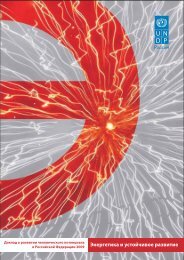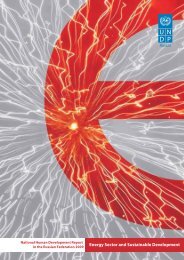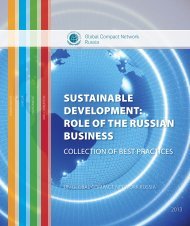Report - UNDP Russia
Report - UNDP Russia
Report - UNDP Russia
Create successful ePaper yourself
Turn your PDF publications into a flip-book with our unique Google optimized e-Paper software.
which is the world’s first and only power stationusing a BN-600 fast neutron reactor. The next step indevelopment the fast neutron technology is the BN-800 reactor, which is now being built at Beloyarskand will use mixed oxide fuel: a blend of plutoniumand depleted uranium (so-called MOX fuel), whichcan be made from depleted plutonium byproducedat thermal neutron reactors. A facility formaking MOX fuel is being built simultaneously withthe BN-800 reactor, and both are scheduled forlaunch in 2014.The idea of MOX fuel is not new: this fuel iscurrently used by a number of nuclear power stationsin Europe, primarily in France. Its advantages are thatit uses more energy-efficient plutonium and resolvesthe problems of disposal. Fast reactors can use thesame fuel multiple times, creating a closed fuel loopand resolving two important issues:• Providing the nuclear power industry with longtermfuel supplies;• Reducing the amount of radioactive waste thathas to be disposed of, and consequently the costof disposal.Fast reactors with a sodium heat-carrierare not the only recent innovation in the industry.Designs are now being developed for fast reactorsthat use liquefied heavy metals (lead and bismuthlead).The primary importance of this technologyis its potential application: today’s nuclear powerstations are very large facilities, but reactors usingheavy metals are designed for use in small- tomedium-scale power stations, which candeployed in remote areas or regions where largepower stations are simply not needed. Variousalternative fuels for fast reactors are also beinglooked at, and projects are in hand to use nuclearreactors for non-electric purposes, such as waterdesalination.Research needs to be diversified tomaintain the industry’s innovative potential andcreate a ‘production line’ of reactor and fueltechnologies at different stages of preparedness forindustrial use. These are the aims of the federaltarget programme, ‘New Generation Nuclear PowerTechnologies for 2010–2015 and through 2020’,designed to create a technological platform fornuclear power stations based on closed nuclear fuelloops with fast reactors, which would meet thecountry’s increasing demand for energy resourcesand increase the efficiency of natural uranium andspent nuclear fuel utilisation.Shortage of specialistsThe current nuclear renaissance has made itclear to all developed nations that the nuclearindustry needs to preserve and develop its humanresources. In the recent past, negative publicperception and unclear prospects made jobs in thenuclear power industry and nuclear science lessprestigious and promising. As a result the industry haslost nearly a generation of engineers and specialists,who chose not to pursue careers in the nuclearindustry.Nearly all countries have felt this humanresource drain in the nuclear sector and begun toimplement more aggressive programmes toattract and train new staff. India and China havealready managed to significantly improve theirhuman resource capacity in nuclear engineering.<strong>Russia</strong> also suffered the full impact of nuclearstagnation, exacerbated by cuts in military andresearch programmes. The crisis of the 1990s alsomade a negative contribution. All of <strong>Russia</strong>’sengineering professions have experiencedshortages of trained staff, so that engineeringpositions in many industries, including nuclear,still have to be filled with older employees. If newnuclear technologies are to be developed andnew power stations are to be built, the industryneeds a long-term supply of skilled humanresources.Transfer of knowledge from onegeneration of technicians to the next is aprerequisite for preserving and developing anyhigh-tech industry, and there is a risk that theageing generation of specialists in the nuclearindustry will disappear, leaving few heirs.Attention is therefore being focused, as a matterof urgency, on training of new specialists andcreation of a system that will attract and retainyoung engineers in the nuclear sector, thanks toadequate opportunities for social and professionaldevelopment.120 National Human Development <strong>Report</strong> in the <strong>Russia</strong>n Federation 2009












